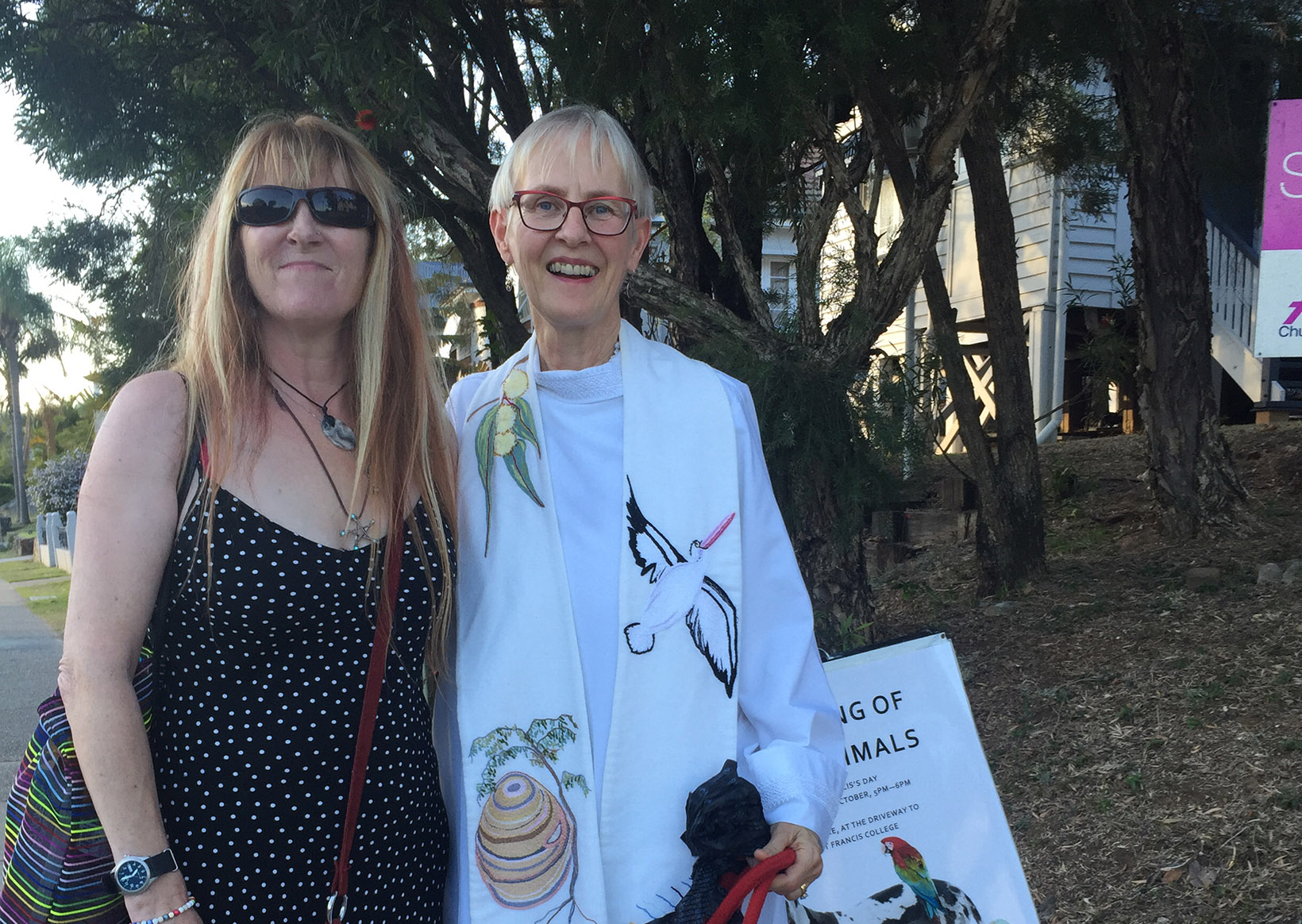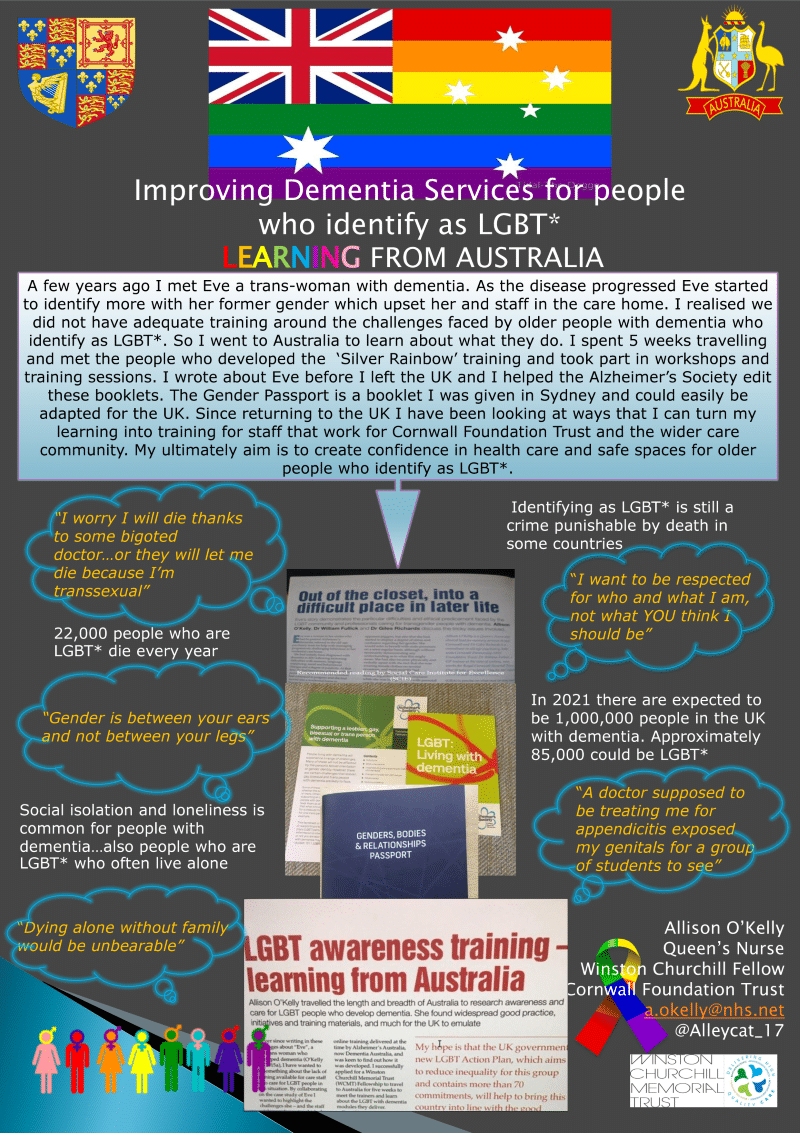Learning about LGBT+ Dementia Care Down Under
10 December 2019 | Allison O'Kelly, Queen's Nurse
Last year I wrote a blog about receiving a travel grant from the Winston Churchill Memorial Trust to spend time in Australia to learn about their training for staff caring for people who identify as LGBT+ with dementia.
Well, in September 2018 I embarked on that long journey, firstly to Sydney then Adelaide, Melbourne, Brisbane and Cairns. I spent five weeks in total meeting course developers, trainers, care home providers, transgender rights activists and generally lovely people. All were passionate about dementia and getting it right for people who identify as LGBT+.
I attended training courses and workshops both face to face and on-line. I learnt that unlike the UK, the Australian government has a commitment to ensure staff training is available and mandatory in every territory and state with dedicated funding. The training was developed by people who identify as LGBT+ as are most of the trainers.
I learned about rarer forms of dementia that can affect this population, such as HIV-Associated Dementia (HAD) and HIV-Associated Neurocognitive Disorder (HAND), a pseudo-dementia that is medication-related and reversible. I also learned about the higher risk of developing a dementia from prolonged hormone use and/or other co-morbidities. Part of my mission is to create safe healthcare spaces where people identifying as LGBT+ feel supported to take part in screening and health promotion programs such as breast, prostate and cervical screening.
I was introduced to the ‘Gender Passport’, a brilliant little document that only needs completing once so people do not have to ‘out’ themselves continually. This could easily be converted for use in the UK.

I was really impressed with the networking and connectivity of the trainers and programme developers in this vast country and it is certainly something the UK can learn from. My time in Australia was a very worthwhile learning experience in which I was able to gather training materials and meet generous and inspiring people. Most of them identified as LGBT+.
Among their biggest concerns were getting older, the possibility of dementia, other people’s attitudes and being alone. Australia has made a commitment to gender diversity and awareness with most of the trainers I met being openly LGBT+, thereby ensuring services get it right in the future, and for their future. In some ways this has allowed people who identify as LGBT+ to be more visible, something which is also becoming more evident in the UK as younger people feel more comfortable with being ‘out’.
On my return to the UK I found out I had been shortlisted for an internal staff award for ‘Partnership Working’ which I WON!!!!
Now that my report is complete, I will be concentrating on making the training I received a reality in Cornwall. I am also looking at introducing LGBT+ awareness training and a trans advocate into student nurse and junior doctors’ educational programmes. I also be exhibited a poster about my work at the Dementia UK Congress in Doncaster in November.

Allison O’Kelly
Queen’s Nurse
Cornwall Partnership NHS Foundation Trust Research Fellow
Winston Churchill Fellow
a.okelly@nhs.net
References
I kept a travel blog of my time in Australia which is available here.
My follow up story was published in the Journal of Dementia Care: O’Kelly, A. (2019) LGBT awareness training –learning from Australia, Journal of Dementia Care, 27, (3), p.p. 16-17
The original article was also published by the Journal of Dementia Care: O’Kelly, A. Fullick, W. Richards, G. (2015) Out of the closet, into a difficult place in later life. Journal of Dementia Care, 23, (3), p.p. 22-24 May/June
You can download my completed Winston Churchill report from the WCMT website here.
Follow my progress on Twitter @Alleycat_17 #ExtraordinaryQNs #lgbtanddementia
Photo by Jasmin Sessler on Unsplash.

 Back to Blog
Back to Blog